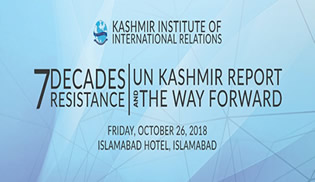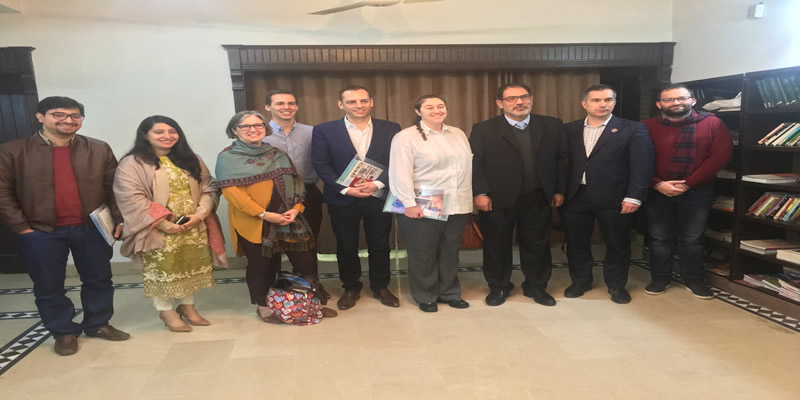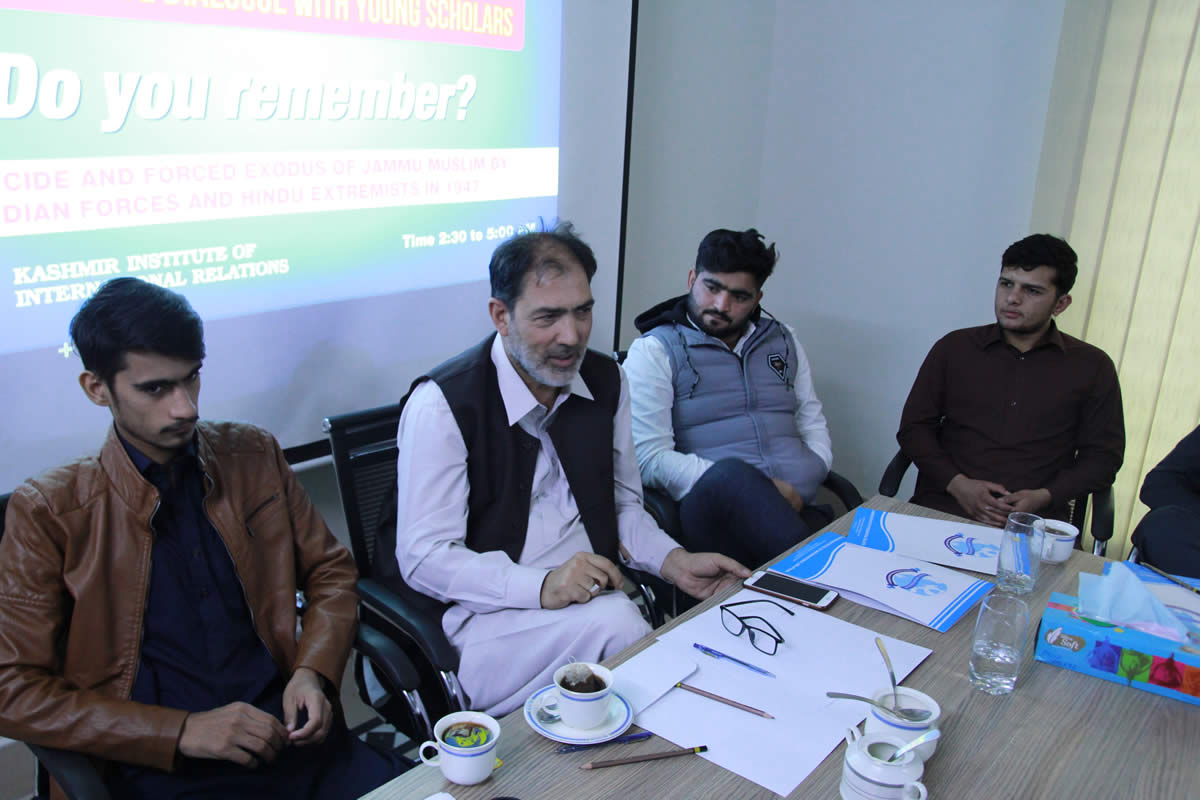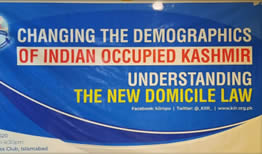UN Special Rapporteurs Communication and State Response
Webinar Report
Moderator:
- Mr. Altaf Hussain Wani (Permanent member of WMC, Geneva and Chairman KIIR).
Notable Speakers:
- Dr. Iqtidar Cheema (Member, United Nations Global Steering Committee, Director of HEI)
- Julie Ward (Former MEP)
- Dr. Syed Nazir Gilani (President JKCHR)
- Barrister Tanvir Munim (Counsel of International Criminal Court; Barrister of the Lincoln’s Inn, UK)
- Robert Fantina (Author and Journalist)
- Mary Scully (Social Activist)
- Advocate Parvez Ahmed Shah (Former General Secretary APHC)
- Prof. Dr Shagufta Ashraf (Event Coordinator KIIR)

Highlights
World Muslim Congress in collaboration with KIIR organized a sideline event, during the 48th session of UNHRC, titled “UN Special Rapporteurs Communication & State Response” on Sep 21, 21, at 05.00 PM (pst). The webinar was attended and addressed by noted human rights activists, international law experts, social activists and academicians including Dr Iqtidar Cheema, Member, United Nations Global Steering Committee, Director of a HEI, human rights defender. Julie Carolyn Ward, former Member European Parliament. Dr Syed Nazir Gilani, President Jammu and Kashmir Council for Human Rights (JKCHR). Barrister Tanvir Munim, Counsel of the International Criminal Court; Barrister of the Lincoln's Inn, UK. Robert Fantina, author and journalist. Mary Scully, Social activist & Writer. Advocate Parvez Ahmed Shah, former General secretary of APHC. Prof. Dr Shagufta Ashraf, Event coordinator KIIR and Altaf Hussain Wani, Permanent Representative of WMC at Geneva. Chairman KIIR. The webinar was moderated by Mr. Altaf Hussain Wani.
Mr. Altaf Hussain Wani,
Representative WMC, Chairman Kashmir Institute of
International Relations welcomed and thanked all the speakers for joining the webinar.  Mr.
Wani explained the Special procedures
constitute a very important part of the UN
Human Rights mechanisms. Special
Rapporteurs are independent experts
working on behalf of the United Nations
(UN). They provide expert opinions to
state in improving their human rights. They
are responsible for the development of
international human rights standards,
awareness, advocacy, and present specific
reports to the council. They also report on the
specifi c issue of HR violations to countries concerned. While talking about the title, Mr. Wani
explained that since Aug 5, 2019, we noticed series of communication by special rapporteurs
both jointly and individually, to the government of India regarding the human rights violations
they have committed till now. But there has never been a good response by the Indian
government to the human rights reports by the special rapporteurs. Mr. Wani explained the
main objective of this webinar was to get the learned opinion from learned scholars on these issues. To understand the ways and means for the victims of the human rights violations to
get influenced by the special rapporteurs’ communication, Mr. Wani first requested Dr. Syed
Nazir Gilani to speak on the subject.
Mr.
Wani explained the Special procedures
constitute a very important part of the UN
Human Rights mechanisms. Special
Rapporteurs are independent experts
working on behalf of the United Nations
(UN). They provide expert opinions to
state in improving their human rights. They
are responsible for the development of
international human rights standards,
awareness, advocacy, and present specific
reports to the council. They also report on the
specifi c issue of HR violations to countries concerned. While talking about the title, Mr. Wani
explained that since Aug 5, 2019, we noticed series of communication by special rapporteurs
both jointly and individually, to the government of India regarding the human rights violations
they have committed till now. But there has never been a good response by the Indian
government to the human rights reports by the special rapporteurs. Mr. Wani explained the
main objective of this webinar was to get the learned opinion from learned scholars on these issues. To understand the ways and means for the victims of the human rights violations to
get influenced by the special rapporteurs’ communication, Mr. Wani first requested Dr. Syed
Nazir Gilani to speak on the subject.
Dr. Syed Nazir Gilani
Dr. Syed Nazir Gilani expressed his thankfulness to KIIR and WMC for organizing this
webinar. He commented that the UN
regime of human rights hinges on special
rapporteurs, independent experts, and
working groups. It gained momentum in
1967 when we had the first working group
on human rights in South Africa. At this
point, we have around 44 thematic
mandates and 11 country experts. Article 2
of the UN Charter obligates all the member
nations to cooperate with the UN
mechanism of Human rights.  Dr. Gilani
explained that how it is impossible for any country to run away from this mechanism, even
Britain in 2018 & America in 2017 couldn't run away from the investigation by the UN experts
regarding human rights and poverty and this investigation revealed that two of the 5 worldleading economies have pockets of immense poverty. The government of India was subject to
a request by 19 experts in 2020, asking India to explain certain areas because the special
rapporteur investigates, reports and advises which helps in creating a mechanism of human
rights. He further explained that special Communications are important around the world.
Unfortunately, India put its back on these requests and the UNHR council. Dr. Gilani expects
that there might come a time when India might lose itself at every international platform
including the General Assembly, Security Council, and in UN Human Rights Council altogether
because if India does not discharge the obligations on article 2 of the UN charter, it wants to
remain in Security Council, in General Assembly & in the Human Rights Council at the same
time India violates the requests of the UN mechanism principal elements of the UN charter.
He exemplified that in 2005 Israel requested United Nations to expel Iran from the General
Assembly for its violations of the principles of the UN charter. He emphasized that there will
come a time when someone will strongly present our case to expel India from the UN General Assembly under article 6 of the UN Charter. This should be remembered very well because
the UN system isn’t relaxing that a member nation of General Assembly, Security Council,
and Human Rights Council ignores the request of 19 experts of HR Council. This is a very
serious situation. It might build up to a point when we might ask a friendly member country
to make a case on behalf of the people of Kashmir that India doesn’t qualify under article 6 to
remain a member. The people of Kashmir have a strong case. He further explained that if the
government of India does not want to open up to the UN system which asks for transparency
for proper reporting and investigation of the human rights situation in IOK, however, there
are the two viable reports of 2018 & 2019 by the OHCHR regarding the violation of human
rights committed by India in IOK. India has failed to respond to these two reports. India has
committed an offense against the UN Security Council's resolutions because it has violated all
of the resolutions in particular the resolution of 30 March 1951 and assumed that India has
the authority to take action in Indian Occupied Jammu & Kashmir. He said that all the
mandates of the UNHR Council have been alerted and concerned because India has
barricaded a vast population of Kashmir who lives on the Indian side of the ceasefire line from
the rest of the world. These communications by UN special rapporteurs are important. India
has to discharge all those obligations that are linked with the UN bodies. In particular, the
working group has also taken up the issue that India has profiled the youth of Kashmir into 5
categories to kill them, and killing the youth in each category carries a reward. India has
created mercenaries to take out of circulation the living youth of Kashmir. He sensitized the
interest of the panelist by narrating that in 1995 his father, 2 uncles, and his brother were
arrested in Kashmir. If special rapporteurs had not made special communication all these
would have been killed under detentions. Dr. Gilani insisted that these rapporteurs’
communications are as important as life-saving drugs. If India continues with its objections to
the UN system then we need to do efforts by advocating a case under article 6 for expelling
India from the UN to tell the world that they need to pay a huge price for violating
international norms.
Dr. Gilani
explained that how it is impossible for any country to run away from this mechanism, even
Britain in 2018 & America in 2017 couldn't run away from the investigation by the UN experts
regarding human rights and poverty and this investigation revealed that two of the 5 worldleading economies have pockets of immense poverty. The government of India was subject to
a request by 19 experts in 2020, asking India to explain certain areas because the special
rapporteur investigates, reports and advises which helps in creating a mechanism of human
rights. He further explained that special Communications are important around the world.
Unfortunately, India put its back on these requests and the UNHR council. Dr. Gilani expects
that there might come a time when India might lose itself at every international platform
including the General Assembly, Security Council, and in UN Human Rights Council altogether
because if India does not discharge the obligations on article 2 of the UN charter, it wants to
remain in Security Council, in General Assembly & in the Human Rights Council at the same
time India violates the requests of the UN mechanism principal elements of the UN charter.
He exemplified that in 2005 Israel requested United Nations to expel Iran from the General
Assembly for its violations of the principles of the UN charter. He emphasized that there will
come a time when someone will strongly present our case to expel India from the UN General Assembly under article 6 of the UN Charter. This should be remembered very well because
the UN system isn’t relaxing that a member nation of General Assembly, Security Council,
and Human Rights Council ignores the request of 19 experts of HR Council. This is a very
serious situation. It might build up to a point when we might ask a friendly member country
to make a case on behalf of the people of Kashmir that India doesn’t qualify under article 6 to
remain a member. The people of Kashmir have a strong case. He further explained that if the
government of India does not want to open up to the UN system which asks for transparency
for proper reporting and investigation of the human rights situation in IOK, however, there
are the two viable reports of 2018 & 2019 by the OHCHR regarding the violation of human
rights committed by India in IOK. India has failed to respond to these two reports. India has
committed an offense against the UN Security Council's resolutions because it has violated all
of the resolutions in particular the resolution of 30 March 1951 and assumed that India has
the authority to take action in Indian Occupied Jammu & Kashmir. He said that all the
mandates of the UNHR Council have been alerted and concerned because India has
barricaded a vast population of Kashmir who lives on the Indian side of the ceasefire line from
the rest of the world. These communications by UN special rapporteurs are important. India
has to discharge all those obligations that are linked with the UN bodies. In particular, the
working group has also taken up the issue that India has profiled the youth of Kashmir into 5
categories to kill them, and killing the youth in each category carries a reward. India has
created mercenaries to take out of circulation the living youth of Kashmir. He sensitized the
interest of the panelist by narrating that in 1995 his father, 2 uncles, and his brother were
arrested in Kashmir. If special rapporteurs had not made special communication all these
would have been killed under detentions. Dr. Gilani insisted that these rapporteurs’
communications are as important as life-saving drugs. If India continues with its objections to
the UN system then we need to do efforts by advocating a case under article 6 for expelling
India from the UN to tell the world that they need to pay a huge price for violating
international norms.
Mr. Wani thanked Dr. Gilani for his knowledgeable input and agreed on working on its suggestions. He then requested Dr. Iqtidar Cheema to speak on the subject.
Dr. Iqtidar Cheema:
Dr. Cheema specifically explained about the communications which are the parts of the
reports related to the 48th session of the Human Rights Council. He elaborated that these communications are the letters sent by the special procedure to the government officials,
intergovernmental organizations, military and Security Company. He stated that the scope of
these special communications is wider as they are applicable on its member as well as nonmember states and other establishments.
These communications are to draw the attention of government officials and others to the alleged human rights violations across the world so that remedial actions can be taken. United Nations Human Rights Council expects a reply to the requests made by these special rapporteurs. Sometimes governments do not stick to the impunity but largely t raises awareness.
He revealed that in the current 48th session the countries like US, UK, France and Spain which portray them as human rights defenders they are being scrutinized as well. The countries like UAE, KSA, Morocco and so many others which financially contributed to the UHRC are being scrutinized.
He stated that when it comes to restrictions and blackouts, issues related to women, farmers, extra judicial killings and all that India is at the top. He quickly elaborated the Kashmir specific issues first, especially the arrest and death of Mr. Muhammad Ashraf Khan Sehrai. He stated that we have been consistently voicing the issue while he was detained. He elaborated the detention case of Mr. Naseer Ahmed Wani and restrictions on the journalism.
He stated that when it comes to Kashmir we cannot neglect the efforts of UN. He mentioned about the special report of OHCHR published in 2019. There might e so many faults in UN but it cannot be misled by any specific country. He urged the Kashmiri leadership to look at the wider picture of what’s happening in India and how international community is responding to that. He emphasized that the government of India has shown ill response to the special rapporteurs and specifically talking about the violations in Kashmir he revealed that India has not shown any response at all. In case of response to the farmer’s issue India provided a greater picture of its narrative but on ground the situations are quite different.
He highlighted that Kashmir is not the only issue that India has been violating. He suggested that the interested nations need to lobby with the other nations who are willing to work for achieving their goal. He emphasized that there is need to voice with others. The oppressed marginalized people need to work together in the region as well as outside. Mr. Wani thanked Dr. Cheema for his inputs. He invited Mr. Robert Fantina for his reflections in the topic.
Mr. Robert Fantina:
Mr. Fantina thanked previous panelists for their remarks. He opened up his discussion by
shedding the light on importance of sensitizing this issue. He stated that brining these cases
to the attention of UN would cause reputational damage to India, which is an important thing
to do. He added that doing this will shine a light on
at least some of the many human rights violations
which India is routinely committing.
He stated that there is a need to draw the attention of governments to the extreme violations committed by India for generations and the situation is further worsened after the abrogation of special status of Jammu and Kashmir. He explained that beside Kashmir there is much wider range of issues Indian people are currently facing such as restriction on social media, atrocities committed against women, farmers and human right defenders etc. He stated that people over there are being killed and there life has been taken brutally by the barbaric Indian government and the draconian laws. Specifically referring to Kashmir he stated that the people are expelled from their homes and lands.
While shedding light on the policies of India he explained that the government of India had created a new policy and its provisions are so broad that anything that criticizes the government of India can be banned. It includes closure of press offices etc. These are the ongoing constant violations of human rights in Kashmir, he added.
He elaborated that India’s ignorance towards the letters from special rapporteurs is a demonstration of its power in front of world. Many powerful governments will not act to curb India for its human right violations due to its economic power.
He suggested that we need to organize people within various countries of the world. The governments would not act until the people force them to act and they start to demonstrate on the streets.
He emphasized that the plight of Kashmiri people need to be publicized at a great degree just like people of Palestine. He said that Kashmir case must not be considered as internal issue as it is stipulated in the United Nations resolutions that future of Kashmir should be decided according to the will of Kashmiri people through plebiscite. He added that it cannot be done until the international community comes to know about what is happening in India and about the violations inside India and Kashmir. Many of the violations are the violations of India’s own constitution but the current government which is very anti-Muslim is turning deaf ears to it.
In the end he stated that it is the people who make the change and they must make the change. The fact that India is ignoring the letters from special rapporteurs should be shocking to everybody.
To summarize, the idea of petition to expel India from UN will have impact on India’s reputation which is very important at the moment. He suggested working on the grass-root level to bring awareness about the sufferings of Kashmiri people.
Mr. Wani thanked Mr. Robert and invited Ms. Julie Ward to elaborate his views on the topic.
Julie Ward
Miss Julie Ward thanked Mr. Wani for the invitation. Miss Julie drew the background it is been
increasingly happening across the world that many
governments and the officials think that special rapporteurs
made reports and comments out of turn without proper
reference to the government. She added that this thing is
particularly more in right-wing authoritarian governments
because they just want to dispense with human rights.
 Furthermore, in places where governments are changing the
constitution and laws to stifle opposition. The governments
are continuing to find any means possible to crack down on
opposition, minority views, protest, and media that is fair and
balanced as opposed to just their agenda. She emphasized that
special rapporteurs are the experts in their fields and it requires a lot of focus and attention. Many rapporteurs have been coming to India to look at various situations and being extremely
critical of the government whether it is the issue of the effect of abrogation of article 370 or
other issues. She said that there is a lot of scrutiny and research is happening on the ground.
It is glad to know that the UN is still sending these experts to do that research with honesty.
One of the most important things is that we continue to show solidarity with all the people
that are minorities, dispossessed, and involved in the self-determination struggle. She
mentioned that our quarrel is with the BJP’s government in India and with Modi because he
has failed his people through the COVID pandemic which demonstrates that there is a lack
of concern to govern fairly for all people. Human rights were never given to anybody, we have
to fight for them. Also, when we have our human rights we need to defend them. She
appreciated the current Secretary-General of the UN Antonio Gutierrez for his global impact
on migration but most of the countries signed up to do it on their own because these
countries are not aligned with these international human rights norms. She suggested putting
some faith in the UN and try to support the work the UN is doing particularly concerning the
special rapporteurs. In the end, she said that we need to appreciate these initiatives of the
UN as they keep sending special rapporteurs to India even though India rejects these
communications but they are still working.
Furthermore, in places where governments are changing the
constitution and laws to stifle opposition. The governments
are continuing to find any means possible to crack down on
opposition, minority views, protest, and media that is fair and
balanced as opposed to just their agenda. She emphasized that
special rapporteurs are the experts in their fields and it requires a lot of focus and attention. Many rapporteurs have been coming to India to look at various situations and being extremely
critical of the government whether it is the issue of the effect of abrogation of article 370 or
other issues. She said that there is a lot of scrutiny and research is happening on the ground.
It is glad to know that the UN is still sending these experts to do that research with honesty.
One of the most important things is that we continue to show solidarity with all the people
that are minorities, dispossessed, and involved in the self-determination struggle. She
mentioned that our quarrel is with the BJP’s government in India and with Modi because he
has failed his people through the COVID pandemic which demonstrates that there is a lack
of concern to govern fairly for all people. Human rights were never given to anybody, we have
to fight for them. Also, when we have our human rights we need to defend them. She
appreciated the current Secretary-General of the UN Antonio Gutierrez for his global impact
on migration but most of the countries signed up to do it on their own because these
countries are not aligned with these international human rights norms. She suggested putting
some faith in the UN and try to support the work the UN is doing particularly concerning the
special rapporteurs. In the end, she said that we need to appreciate these initiatives of the
UN as they keep sending special rapporteurs to India even though India rejects these
communications but they are still working.
Mr. Wani thanked Miss. Julie and agreed on the point that we need to create unity among the groups. He then requested Mr. Tanvir Munim to speak on the subject.
Barrister Tanvir Munim
Barrister Tanvir thanked Mr. Wani for inviting him to participate in the webinar. Talking about the special rapporteurs he said that they are a special mechanism under the UN and they are unpaid experts on their topics. He called special rapporteurs the eyes and ears of the human rights council to examine and publically report the human rights situation of a particular country or theme. Also, they do it by writing and issuing communications, visiting the particular country, and then making a report to the UNHR council and General Assembly.
Pointing out the weaknesses of the systems of the special reports he said:
a) No follow-up procedure after the communication and reports are made.
b) The empty political commitments made by the states and questions rather than implementing the recommendations.
c) Non- cooperation from the international community as well as the states in question.
d) No enforcement mechanism is in place to enforce the recommendations of the special rapporteurs.
Talking about the non-cooperation of the international community he drew the attention that
the special rapporteurs on former Yugoslavia in 1991 Mr. Tadeusz Mazowiecki also a former
Prime Minister of Poland, resigned from his job
because he didn’t get that much support and the
human rights violations exacerbating and he
tried to draw the attention of the international
community. The same thing happened with Mr.
Yash GHAI who was the special rapporteur for
Cambodia, when he criticized the UN system
for not protecting the integrity of his office
when the Cambodian rulers were attacking his
office verbally.
resigned from his job
because he didn’t get that much support and the
human rights violations exacerbating and he
tried to draw the attention of the international
community. The same thing happened with Mr.
Yash GHAI who was the special rapporteur for
Cambodia, when he criticized the UN system
for not protecting the integrity of his office
when the Cambodian rulers were attacking his
office verbally.
After the weaknesses, Barrister Tanvir talked about the possible solutions that can be done to address these particular weaknesses. From the legal perspective, being a lawyer he highlighted that
a) Special rapporteurs, their reports, and recommendations are part of International Human Rights law which is a part of public International Law whose enforcement is based on persuasion, scheduling, and recent arguments. There is no exception to it and this is the first thing the special rapporteurs should do.
b) The human rights Council is governing the body of this particular special rapporteur. None of the 47 members of the council has the veto power so that they should make the most use of it. The UN General Assembly categorically said that the member states must uphold and protect human rights all around the globe. It is pertinent to mention that India is also a member of the UNHR Council, so they have the utmost duty to protect the human rights of the Kashmiris.
c) Special Rapporteurs brief the Security Council like in 1990, the special rapporteur on violence against women Miss. Radhika Coomaraswamy briefed the UNSC on the situation of the women in Sierra Leone. If the UN makes it an easy procedure for the special rapporteur to brief the Security Council on Kashmir or any other issue might draw much response from the states in question.
d) He highlights that NGOs like KIIR and others are observers of the UN. During the UNHRC session, these NGOs can support the special rapporteurs and refer to the shadow reports to the UN in the poor human rights bodies and other mechanisms.
According to Barrister Tanvir, these steps can be taken to overcome the weaknesses of the special rapporteurs. Talking about the special rapporteurs' report, he said the first report was in Aug 2019. It was made by the special rapporteur to the Indian government where they categorically address the violations of the rights of freedom of expression and right to peaceful assembling. Then on Feb 27th, 2020 the second communication was made to the Indian government on the massive crackdown on those who are showing descended central government. Four special rapporteurs on inhumane and degrading treatment, arbitrary detentions and extra-judicial killings, on minority issues, and religious issues made a joint statement and communication to the government of India telling the deteriorating situation of serious violations of human rights in Kashmir. The UN also asked the Indian government to start the persecution of those who are the perpetrators of the human rights violations under article 6 of the ICCPR which tells the right to life of an individual, article 7 the convention against torture shows that there should be persecution against those who torture and impartial investigation under the article 12. The UN categorically said that to start persecuting those who are the perpetrators of the human rights violations but unfortunately we haven’t seen any response from the Indian government. He also highlighted that this year on 31st March, five special rapporteurs communicated to the Indian government telling them that they have found a systematic pattern of violations of human rights. There is a common thread in the reports of special rapporteurs but yet we haven’t seen any response from the Indian government.
In the end, he said that the responsibility of other member states under UN resolution 60’51 is to protect and promote human rights. Because of these resolutions sit has become a part of the international human rights law as well as public international law. India being a member of it should first step in to protect the human rights of the Kashmiri subjects. If there is a violation of human rights then all the states must interfere and take action. If India refuses to do so, then according to ample law if India wants to defend the wrongful acts these defenses are not much sustainable. Moreover, there is a drafted article adopted by the International law commission in 2001 responsibility of a state for wrongful acts in article 4 paragraph 1 of that article says that the liabilities should be attributed to states for the atrocities committed by their organs whether judicial, executive or legislature. HR committee also said in the interpretation of ICCPR that if the domestic remedy is ineffective and not available then its exhaustion is not necessary. So the International forums like ICJ and others can be approached directly. He suggested that the best forum for a state to take action against India is ICJ under the article of 36/1 and article 36 paragraph 2 of ICJ statute and for individuals the best forum is ICC but neither India nor Pakistan nor China are a part of its governing statute.
Mary Scully
Miss Mary Scully recognizes herself who thinks the UN more as a part of the problem and
less as a part of the solution. She said that until 2015 she did not know about the freedom
struggle of Kashmir because of the media blackout. There was news disconnected and
disjointed news about Kashmir on media even in New York Times. It was the activity of
Kashmiri activists along with Pakistani allies who broke out media blackout through the
pioneering use of social media in a time of fewer than 10 years. She highlights that through
these efforts people like her got to know about
the Kashmir issue and human rights violations
going on along with the militarization, use of
pellet guns, assault protests- and all are
introduced to them through the internet by
Kashmiris. Now India being aware of how
effective the news blackout was in terms of
building support around the world, imposed it
in a draconian way in 2019 where we were
being disconnected from all the connections in
Kashmir for 6 to 8 months. She emphasized that
by seeing Kashmiri activists opening up on social media they once again impose a draconian
blackout to crush the presence of Kashmiris on social media. Furthermore, she discussed the
extreme repression of journalism in Kashmir. The news blackout is one of the most effective
ways of used by India shutting down any possibility for people to become informed about the
ground realities of Kashmir. According to her, the issue alone of pellet guns is enough to ignite and inspire solidarity around the world because it is so gruesome that you would take a
weapon of buckshot which is outlawed for using against birds and animals. But what India
does, is using them routinely against the Kashmiris. Miss Scully suggested that we have to
employ the kind of strategies to teach the activists regarding the Kashmir movement. We
need to find ways to overcome news blackouts because we cannot let India dictate whether
or not we can build social movements and defend things. The other important thing she
highlighted is the massive upsurge around a, particularly heinous event like in 2014 when Israel
was carpet scorched earth bombing Gaza for 7 weeks, there were over a million people
around the world that protested. For Kashmir, there were major demonstrations around the
world in 2019. She insisted that we cannot rely on spontaneity on spontaneous upsurges of
support. We have to build a consistent orchestrated democratic international movement that
coordinates the activities on social media and in public rallies and speaks out on all sorts of
events. She insisted on having a coordinated consisted and annual campaign. The other
important point she raised is that New York Times, Washington Post, all other major media
have the resources to do coverage on Kashmir despite media blackout. The reason not to do
so is political. India has good trade and other partnerships with countries like the USA, France,
etc. The second problem is the lack of a substantial anti-colonial movement in India. Miss.
Scully focused on the point that building movements will expose our governments first and
their involvement in India in the occupation, secondly it would put pressure on the Indian
radicals and liberals to take a look at the question of Kashmir to recognize it as an anti-colonial
struggle.
It was the activity of
Kashmiri activists along with Pakistani allies who broke out media blackout through the
pioneering use of social media in a time of fewer than 10 years. She highlights that through
these efforts people like her got to know about
the Kashmir issue and human rights violations
going on along with the militarization, use of
pellet guns, assault protests- and all are
introduced to them through the internet by
Kashmiris. Now India being aware of how
effective the news blackout was in terms of
building support around the world, imposed it
in a draconian way in 2019 where we were
being disconnected from all the connections in
Kashmir for 6 to 8 months. She emphasized that
by seeing Kashmiri activists opening up on social media they once again impose a draconian
blackout to crush the presence of Kashmiris on social media. Furthermore, she discussed the
extreme repression of journalism in Kashmir. The news blackout is one of the most effective
ways of used by India shutting down any possibility for people to become informed about the
ground realities of Kashmir. According to her, the issue alone of pellet guns is enough to ignite and inspire solidarity around the world because it is so gruesome that you would take a
weapon of buckshot which is outlawed for using against birds and animals. But what India
does, is using them routinely against the Kashmiris. Miss Scully suggested that we have to
employ the kind of strategies to teach the activists regarding the Kashmir movement. We
need to find ways to overcome news blackouts because we cannot let India dictate whether
or not we can build social movements and defend things. The other important thing she
highlighted is the massive upsurge around a, particularly heinous event like in 2014 when Israel
was carpet scorched earth bombing Gaza for 7 weeks, there were over a million people
around the world that protested. For Kashmir, there were major demonstrations around the
world in 2019. She insisted that we cannot rely on spontaneity on spontaneous upsurges of
support. We have to build a consistent orchestrated democratic international movement that
coordinates the activities on social media and in public rallies and speaks out on all sorts of
events. She insisted on having a coordinated consisted and annual campaign. The other
important point she raised is that New York Times, Washington Post, all other major media
have the resources to do coverage on Kashmir despite media blackout. The reason not to do
so is political. India has good trade and other partnerships with countries like the USA, France,
etc. The second problem is the lack of a substantial anti-colonial movement in India. Miss.
Scully focused on the point that building movements will expose our governments first and
their involvement in India in the occupation, secondly it would put pressure on the Indian
radicals and liberals to take a look at the question of Kashmir to recognize it as an anti-colonial
struggle.
In the end, she said that nothing is more important than educating people around the world about the struggle of the Kashmiri people for freedom which is an inspiration. It must be supported and defended. Mr. Wani thanked her for raising some important points. He then invited Parvez Ahmad Shah for his input.
Advocate Parvez Ahmad Shah:
Parvez Ahmad Shah thanked Mr. Wani and KIIR for the invitation. He opened up the discussion with a deliberation about the article 2 and stressed that UN members have to follow the directions and laws proposed by the UN and stated that India has disregarded this very important article. It was India who first took the Kashmir cause in the UN. But now India backtracked from the UN resolutions and installed the regimes in IOK to suppress the right to self-determination of Kashmiri people but Kashmiris continued their struggle for independence.
He talked about the two reports from UNHC and
expressed that these reports on the situation of
Kashmir created a political optic.  He added that it did
not make any difference on ground because India was
asked to stop the use of force but the continued.
He said that the communication from special
rapporteurs make a deterrent effect sometimes but
not always. Last communication was made to the
government of India about Ashraf Sehrai who was
killed in custody rather I would say he was killed inside
the prison. He was detained under Public Safety Act (PSA) for raising his voice for people.
The government of India was asked for inquiry but rather inquiring India put his two sons
behind the bars claiming that they have been accompanying their father for his burial and they
have not been released yet.
He added that it did
not make any difference on ground because India was
asked to stop the use of force but the continued.
He said that the communication from special
rapporteurs make a deterrent effect sometimes but
not always. Last communication was made to the
government of India about Ashraf Sehrai who was
killed in custody rather I would say he was killed inside
the prison. He was detained under Public Safety Act (PSA) for raising his voice for people.
The government of India was asked for inquiry but rather inquiring India put his two sons
behind the bars claiming that they have been accompanying their father for his burial and they
have not been released yet.
He further discussed that how Syed Ali Gilani was dealt with and how he was buried in absence of family members. He was under house arrest for 11 years. Syed Ali Gilani and Sheikh Abdullah had much influence in the Indian occupied Jammu and Kashmir for the last 72 years. India, on one hand, is killing the people of Kashmir and on another hand, it is cheating the demographic composition of Jammu and Kashmir.
While concluding his remarks he appreciated Mr. Gilani who wonderfully referred to Article 6 to raise the voice against India. The only remedy we have is to pool our energies to raise our voice by asking the UN to activate Article 6 against India to expose the impression of leadership they have created in front of the world. In a nutshell, he emphasized that we have to work and make a case against India. The only choice we have is to activate the mechanism of the UN. We should work together to support the freedom struggle of the Kashmiris.
Concluding Remarks
Nazir Gilani
Thank you very much. It was inspirational to hear from the cluster of scholars. My submission would be that we have to quantify our efforts. As Parvez Shah said that you have no exit except to activate the UN template on Kashmir, you would be misdirecting yourself, you would be going a drift away from the UN template on Kashmir. And I agree that revoking Article 6 would be difficult but there is nothing impossible in this world if the UN can investigate India so we have to build pressure on the UN for allowing India noncompliance. India has the responsibility in front of General Assembly, security council and Human Rights Council and in the neighborhood as well.
It was a wonderful interaction with everyone I enjoyed it a lot.
Robert Fantina
I want to thank everybody for their participation, I learned a lot and I was inspired by the good conversation here. One of the major problems addressed here about the weakness of the special rapporteur. As Scully said organize people and educate them is really needed I agree with this point. The atrocities happening in Kashmir need to be publicized.
Barrister Tanvir Munim
Thank you very much, Mr. Wani for giving me the opportunity to speak here, I have learned a lot from the speakers from different parts of the world. I hope that in the next stage of the special rapporteur’s procedure, the Human Rights Council will start HRC-mandated investigations into the situation as we have seen in Syria, Venezuela, Maynmar. I believe if HRC-mandated investigations would be undertaken we will see a greater response from the Indian government hopefully.
Mary Scully
I agree that we cannot be dismissive of United Nations I think that they are part of the problem but I also believe that they should be enforced for a referendum on Kashmir. UN would be likely to do that if we would put pressure on individual countries to do the right thing regarding the Kashmir conflict. Thank you.
Altaf Hussain Wani (Chairman KIIR)
Thank you so much to all the penalists. We have to create awareness around the world and
with the UN cabinet we have to create the awareness in political circle as well. We have to
create mass support for the people of Kashmir. With all this, I thank you all and hopefully see
you again in another webinar.
Flyer

YouTube Link

Media Coverage
|
|
|

|
|
|
|
|
|
|
|
|
|
|
Past Events
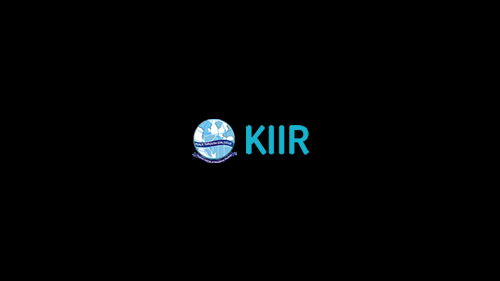













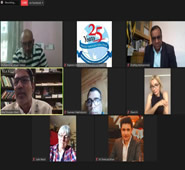
_1627626452.jpg)
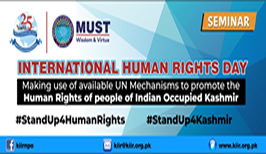














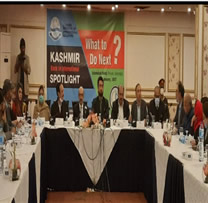
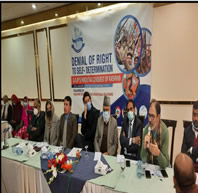
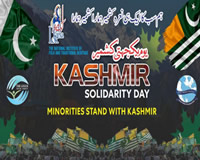
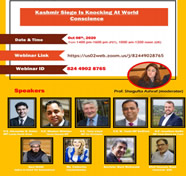
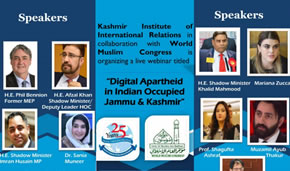
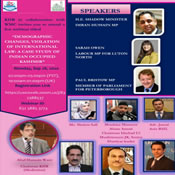
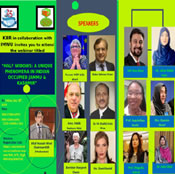
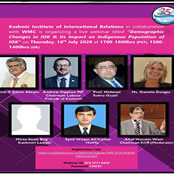
_1627627084.jpg)
